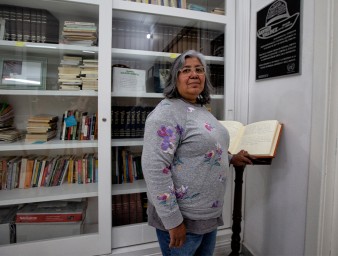Practical measures to promote a culture of tolerance
15 July 2011

‘‘Intolerance, including anti-semitism, islamophobia and christianophobia, is on the increase’’ said UN Human Rights chief Navi Pillay at a panel discussion on the promotion of a culture of tolerance held last June in Geneva.
Pillay opened the expert panel stating that “through dialogue and collaboration “ States could step up to their obligations and take practical decisive actions and measures to address and eliminate incidents of intolerance. ’’
Experts at the panel discussion identified intercultural dialogue, awareness-raising, education and criminalization of incitement to hatred and intolerance, as practical measures that could possibly combat religious intolerance and promote a culture of tolerance.
Pillay said that States should act as catalyst for intercultural dialogue. She identified education as crucial in ‘‘fostering respect for all human rights and religious diversity,’’ and said that by committing in practice - through laws, measures, words and deed - to all human rights, “States can promote religious harmony and facilitate the intercultural dialogue which helps create peaceful and stable societies.”
The promotion of reciprocal understanding between cultures was also suggested as a measure to combat the persistent ‘‘dark, obscuring, cultural glasses’’ that religious intolerance creates, said Doudou Diène, Vice-Chair of the International Institute of Politics and Civilization Research.
Simona Santoro, who works for the Organization for Security and Co-operation in Europe (OSCE), said that OSCE used educational tools to teach students and civil society, and to train teachers about other cultures. ”Supporting civil society to come together and learn from each other’s experience, can be very beneficial,’’ Santoro said.
She also spoke about various legislative and administrative measures OSCE takes to combat religious intolerance. For instance, OSCE offers to review governments’ legislations on freedom of religion and belief and also developed guidelines and key policy issues for combating hate crime.
To foster a culture of tolerance, Amir Bilal Soofi, President of the Pakistani think-tank Research Society on International Law, suggested a legislation ‘‘criminalizing incitement to imminent violence’’ and that religious sites be legally declared as ‘‘special places’’. He also proposed a regular ‘‘institutionalized inter-faith debate amongst the genuine religious scholars, jurists and experts.’
The US Ambassador-at-Large for International Religious Freedom Suzan Johnson Cook highlighted the duty that political leaders had to inform civil society about religious tolerance and to act on legislation. She believed that states had ‘‘tools at their disposal to combat religious intolerance’’ and solely needed the political will to use them. In her opinion, it was the responsibility of leaders to criticize hateful ideology. She also deemed preventative measures key to combating religious intolerance because ‘‘it is better to create a climate that seeks to prevent discrimination and violence before it happens.”
Pillay expressed the hope that the panel discussion would help promote “a culture of mutual respect for diversity and a better appreciation of its enriching quality.”
Practical measures to promote tolerance will also likely be discussed in a series of regional workshops on the prohibition of incitement to national, racial or religious hatred, as reflected in international human rights law, being organized by the UN Human Rights office throughout 2011.
15 July 2011

VIEW THIS PAGE IN:


